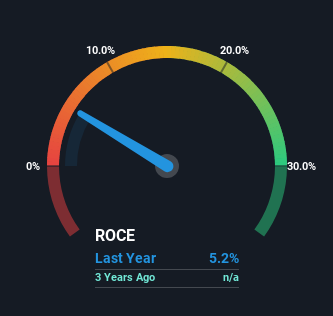- Japan
- /
- Professional Services
- /
- TSE:9563
Here's What To Make Of Atlas Technologies' (TSE:9563) Decelerating Rates Of Return

Did you know there are some financial metrics that can provide clues of a potential multi-bagger? In a perfect world, we'd like to see a company investing more capital into its business and ideally the returns earned from that capital are also increasing. If you see this, it typically means it's a company with a great business model and plenty of profitable reinvestment opportunities. Although, when we looked at Atlas Technologies (TSE:9563), it didn't seem to tick all of these boxes.
Return On Capital Employed (ROCE): What Is It?
For those who don't know, ROCE is a measure of a company's yearly pre-tax profit (its return), relative to the capital employed in the business. To calculate this metric for Atlas Technologies, this is the formula:
Return on Capital Employed = Earnings Before Interest and Tax (EBIT) ÷ (Total Assets - Current Liabilities)
0.052 = JP¥130m ÷ (JP¥2.8b - JP¥261m) (Based on the trailing twelve months to December 2023).
Thus, Atlas Technologies has an ROCE of 5.2%. Ultimately, that's a low return and it under-performs the Professional Services industry average of 15%.
See our latest analysis for Atlas Technologies

Historical performance is a great place to start when researching a stock so above you can see the gauge for Atlas Technologies' ROCE against it's prior returns. If you want to delve into the historical earnings , check out these free graphs detailing revenue and cash flow performance of Atlas Technologies.
What Does the ROCE Trend For Atlas Technologies Tell Us?
Things have been pretty stable at Atlas Technologies, with its capital employed and returns on that capital staying somewhat the same for the last . It's not uncommon to see this when looking at a mature and stable business that isn't re-investing its earnings because it has likely passed that phase of the business cycle. So unless we see a substantial change at Atlas Technologies in terms of ROCE and additional investments being made, we wouldn't hold our breath on it being a multi-bagger.
Our Take On Atlas Technologies' ROCE
In a nutshell, Atlas Technologies has been trudging along with the same returns from the same amount of capital over the last . It seems that investors have little hope of these trends getting any better and that may have partly contributed to the stock collapsing 73% in the last year. All in all, the inherent trends aren't typical of multi-baggers, so if that's what you're after, we think you might have more luck elsewhere.
If you'd like to know more about Atlas Technologies, we've spotted 5 warning signs, and 2 of them are concerning.
While Atlas Technologies may not currently earn the highest returns, we've compiled a list of companies that currently earn more than 25% return on equity. Check out this free list here.
New: Manage All Your Stock Portfolios in One Place
We've created the ultimate portfolio companion for stock investors, and it's free.
• Connect an unlimited number of Portfolios and see your total in one currency
• Be alerted to new Warning Signs or Risks via email or mobile
• Track the Fair Value of your stocks
Have feedback on this article? Concerned about the content? Get in touch with us directly. Alternatively, email editorial-team (at) simplywallst.com.
This article by Simply Wall St is general in nature. We provide commentary based on historical data and analyst forecasts only using an unbiased methodology and our articles are not intended to be financial advice. It does not constitute a recommendation to buy or sell any stock, and does not take account of your objectives, or your financial situation. We aim to bring you long-term focused analysis driven by fundamental data. Note that our analysis may not factor in the latest price-sensitive company announcements or qualitative material. Simply Wall St has no position in any stocks mentioned.
About TSE:9563
Atlas Technologies
Provides fintech consulting and project execution support services in Japan.
Flawless balance sheet low.
Market Insights
Community Narratives



